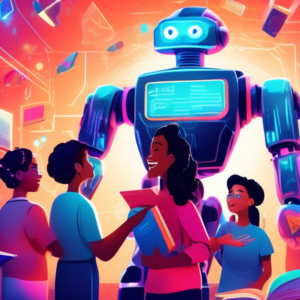AI’s Popularity Surges Among Students and Teachers
Artificial intelligence (AI) is rapidly changing the world around us, and education is no exception. In classrooms across the globe, AI is making its presence felt, transforming traditional learning and teaching methods. From personalized learning experiences to automated grading systems, AI tools are capturing the attention of both students and educators. This surge in popularity stems from the numerous benefits AI brings to the educational landscape.
AI for Students: A Personalized Learning Journey
One of the most significant advantages of AI in education is its ability to personalize the learning journey for each student. Traditional one-size-fits-all teaching models often struggle to cater to individual needs and learning styles. AI-powered learning platforms address this challenge by analyzing student data, such as their strengths, weaknesses, and learning pace. This data-driven approach enables the creation of personalized learning paths, providing tailored content and exercises that match each student’s unique requirements.
Imagine a world where a student struggling with algebra receives extra support and practice problems tailored to their specific areas of difficulty, while another student excels and gains access to more advanced concepts. This level of personalized learning, made possible by AI, fosters a more engaging and effective learning environment, allowing students to learn at their own pace and maximize their potential.
AI Tools: Empowering Students Beyond the Textbook
The rise of AI has brought forth a plethora of tools designed to assist students in their learning endeavors. These tools extend far beyond the confines of traditional textbooks and classroom lectures, offering innovative ways to study, research, and understand complex concepts. Some notable examples include:
- Intelligent Tutoring Systems: These AI-powered systems act as virtual tutors, providing students with personalized guidance, feedback, and support 24/7. They can answer questions, explain difficult concepts, and even generate practice problems, ensuring students receive the assistance they need, when they need it.
- Smart Writing Assistants: From grammar and spelling correction to plagiarism detection and style suggestions, these AI-driven tools empower students to improve their writing skills. They help students express their thoughts more clearly and effectively, fostering a deeper understanding of language and communication.
- Research and Information Retrieval Tools: The internet is a vast ocean of information, and navigating it effectively can be daunting. AI-powered research tools come to the rescue by sifting through massive amounts of data to provide students with relevant and reliable sources. This accelerates the research process, allowing students to delve deeper into their chosen subjects.
AI in the Hands of Educators: Transforming Teaching Methodologies
AI’s impact extends beyond the student experience; educators, too, are harnessing its power to transform their teaching methodologies. AI tools offer educators more time to focus on what they do best: inspiring, guiding, and mentoring their students.
- Automated Grading and Feedback: AI can efficiently grade multiple-choice tests and even assess subjective assignments like essays, providing consistent and unbiased evaluations. This automation frees up valuable time for educators, allowing them to focus on providing personalized feedback and interacting with students on a more meaningful level.
- Data-Driven Insights for Personalized Instruction: AI can analyze student performance data to identify patterns and trends, providing educators with actionable insights into their students’ learning. These insights empower educators to tailor their teaching strategies, identify students who need extra support, and design interventions to address learning gaps effectively.
- Creating Engaging Learning Experiences: AI tools facilitate the creation of interactive and engaging learning materials, such as virtual simulations, gamified quizzes, and immersive learning environments. These innovative tools can capture students’ attention and make learning more enjoyable and effective.
Addressing the Challenges of AI in Education
Despite the numerous benefits, integrating AI into education does come with its own set of challenges. Addressing these challenges is crucial to ensuring equitable access and responsible implementation of AI in educational settings.
- Ethical Considerations and Data Privacy: As with any technology that collects and analyzes personal data, ethical considerations and data privacy are paramount. Educational institutions must implement robust policies and safeguards to protect student data and ensure responsible AI use.
- Digital Equity and Access: The transformative potential of AI in education can only be realized if all students have equal access to technology and resources. Bridging the digital divide and ensuring equitable access to AI-powered learning opportunities is essential.
- The Human Element in Education: While AI tools are powerful, they should complement and enhance, not replace, the role of educators. The human element in education, such as building relationships, fostering creativity, and providing emotional support, remains irreplaceable.
The Future of Learning: Embracing the AI Revolution
AI is not just a passing trend; it is rapidly becoming an integral part of the educational landscape. As AI technology continues to evolve, we can expect even more innovative applications in the field of education.
From personalized learning paths that adapt to individual needs to intelligent tutoring systems available 24/7, AI has the potential to create a more inclusive, engaging, and effective learning experience for all. Embracing the AI revolution in education, while addressing the associated challenges, will be paramount in preparing students for success in the 21st century and beyond.
